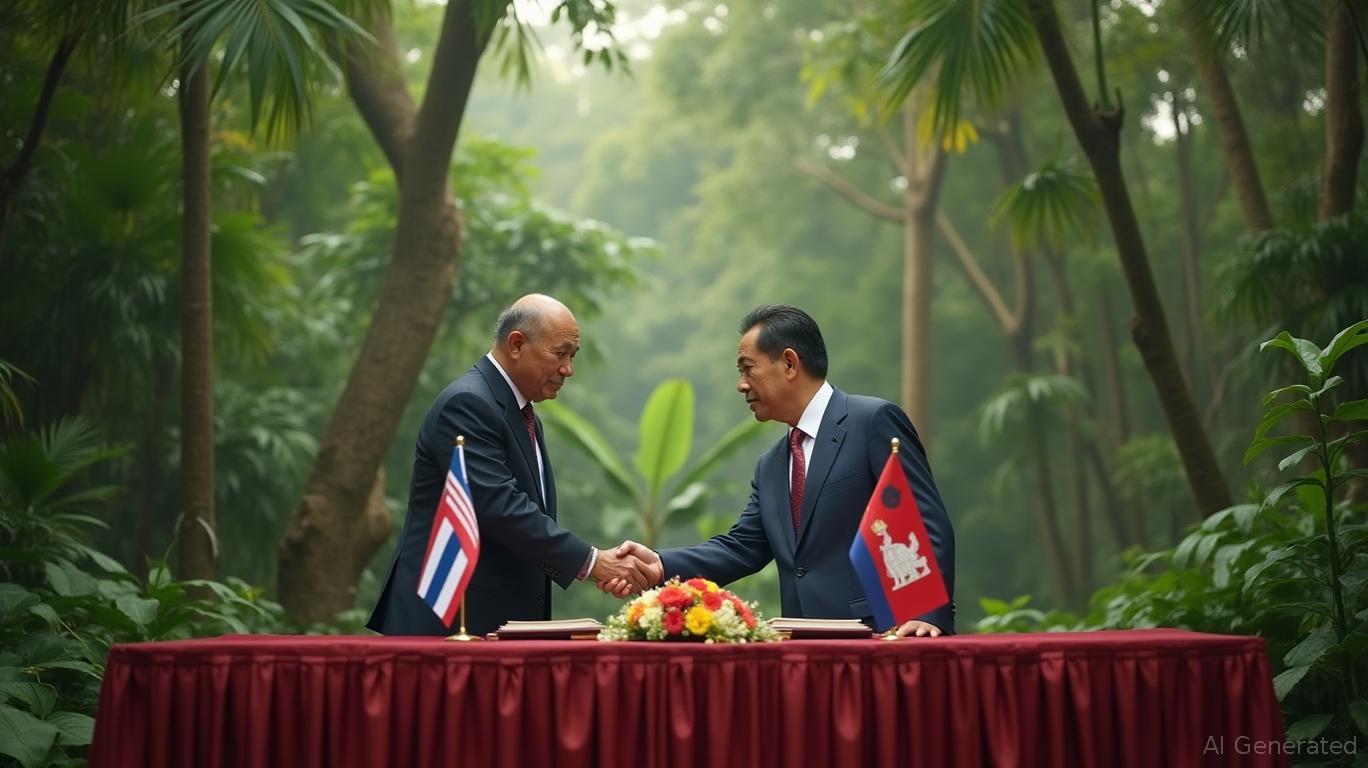U.S.-Supported Thailand-Cambodia Accord: A Strategic Geopolitical Maneuver for Stability in Southeast Asia
- Thailand and Cambodia near historic peace deal, backed by U.S., to end border clashes with weapon withdrawals and joint de-mining. - U.S. involvement highlights regional influence amid China’s growing presence, with Trump set to witness the October 25 signing. - Thailand unveils $150M tourism stimulus to boost domestic travel, balancing fiscal prudence with growth targets. - China-U.S. trade talks in Malaysia aim to ease tensions over tariffs, with both sides addressing trade barriers and rare-earth expo
Thailand and Cambodia are close to reaching a landmark peace deal aimed at ending months of violent border disputes, with U.S. President Donald Trump expected to attend the signing ceremony during the ASEAN summit in Kuala Lumpur. Thai Defense Minister Natthaphon Narkphanit noted that the negotiations have made "substantial headway," as both countries have agreed to pull back heavy weaponry from contested areas, begin collaborative landmine clearance, and form a joint task force to combat cybercrime. The agreement, anticipated to be formalized on October 25, represents a major advance for stability in Southeast Asia, a region long challenged by territorial conflicts and political friction, according to
This accord unfolds against a backdrop of shifting geopolitics, with the U.S. aiming to bolster its regional role as China’s influence expands. American mediation in the July ceasefire and the participation of U.S. observers in ongoing discussions highlight the deal’s strategic weight. Cambodia’s Deputy Prime Minister Tea Seiha stressed the importance of "reciprocal trust and assurance" throughout the talks, which also involve the release of 18 Cambodian soldiers held in detention,

Separately, Thailand’s tourism industry is poised to benefit from a 150 million dollar stimulus initiative designed to encourage local travel and aid economic revival. The government has introduced tax breaks for both individuals and companies, with special incentives for visiting less-traveled provinces and organizing business events. Finance Permanent Secretary Lavaron Sangsnit explained that these policies are intended to spur spending before the peak tourism season, potentially boosting GDP growth by 0.04%. However, the plan is expected to reduce tax income by about 5 billion baht, illustrating the challenge of balancing fiscal responsibility with economic support, as reported by
At the same time, American and Chinese representatives are preparing for trade discussions in Malaysia, aiming to ease tensions heightened by Trump’s recent tariff threats on Chinese imports. The Chinese delegation, led by Vice Premier He Lifeng, will address topics such as rare-earth exports and trade restrictions,
The intersection of these events underscores the shifting economic and political environment in Southeast Asia. Thailand’s internal reforms and diplomatic initiatives are in step with broader U.S. and Chinese efforts to influence trade and security in the region. As ASEAN leaders convene in Kuala Lumpur, the outcomes of the Thailand-Cambodia peace agreement and the China-U.S. trade talks may set important examples for future regional cooperation amid intensifying strategic rivalry.
Disclaimer: The content of this article solely reflects the author's opinion and does not represent the platform in any capacity. This article is not intended to serve as a reference for making investment decisions.
You may also like
Lighter Secures $68 Million to Drive Institutional DeFi Expansion Despite Market Hesitancy
- Lighter secured $68M in a new round led by Founders Fund and Ribbit Capital, valuing it at $1.5B to boost DeFi trading infrastructure. - The funding aligns with a broader crypto VC surge, including Ripple's $500M and Lava's $200M, highlighting institutional interest in blockchain finance. - CEO Vladimir Novakovski emphasized scaling infrastructure with both equity and token subscriptions to enhance institutional-grade trading solutions. - Despite market caution, DeFi protocols like Lighter attract invest
JPMorgan and DBS Establish Unified Cross-Chain Protocol for Institutional Transactions
- JPMorgan and DBS develop blockchain framework for cross-chain tokenized deposit transfers, aiming to set institutional payment standards. - The framework links DBS Token Services with JPMorgan’s Kinexys, enabling 24/7 real-time settlements across public and permissioned blockchains. - It addresses cross-border transaction demands, reducing fragmentation as global banks adopt tokenization. - Overcoming interoperability challenges could redefine institutional liquidity access and market reach.

JPMorgan and DBS Develop Cross-Chain Bridge to Compete with Stablecoin Leaders
- JPMorgan and DBS Bank launch cross-chain framework for real-time tokenized deposit transfers between institutional clients, bypassing traditional payment systems. - The "interoperability highway" enables 24/7 settlements across public/private blockchains while maintaining consistent token value, expanding cross-border transaction capabilities. - As 1/3 of global banks explore tokenized deposits, the partnership challenges stablecoin dominance by offering institutional-grade cross-chain solutions with red
AI's Growing Demand for Power Pushes the Energy Industry Into an Intense Sustainability Competition
- Energy and tech sectors collaborate to address AI's surging energy demands through sustainable computing infrastructure and efficient GPU solutions. - Devon Energy and Alliant Energy boost capital spending on grid modernization and storage, aligning with AI-driven power needs while maintaining shareholder returns. - NVIDIA advances open-source GPU efficiency via Nova driver, yet faces market volatility as AI sector grapples with financial risks and regulatory pressures. - Industry challenges include bala
